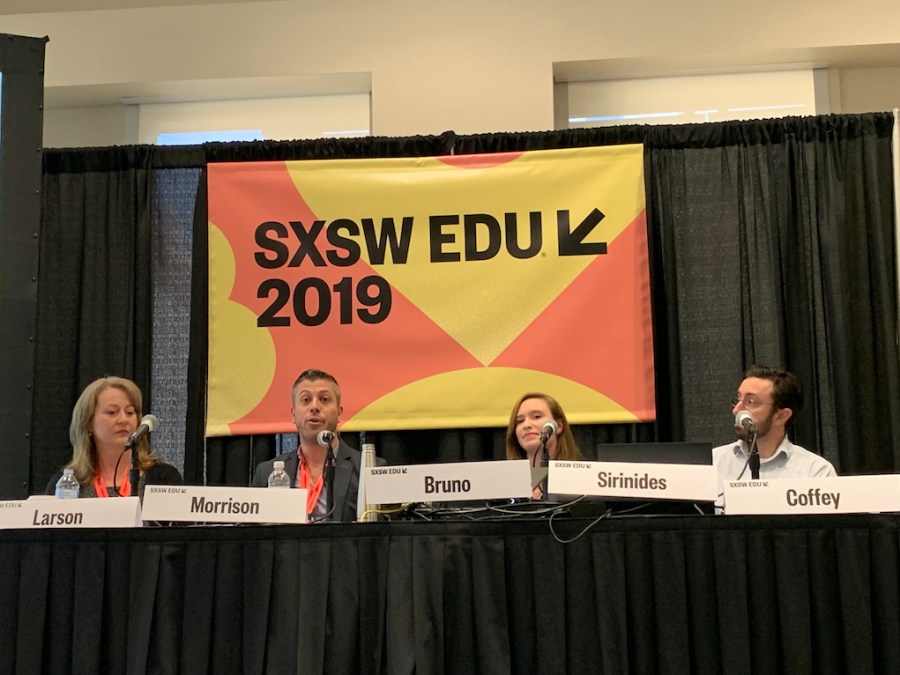States overcome challenges with early childhood education data through collaboration

From a data-gathering perspective, early childhood education is complex — it involves health and progress data of students, families and classrooms and includes federal, state and local organizations, which are often not coordinated with one another. At a panel on Tuesday at South By Southwest EDU in Austin, Texas, state government leaders from Minnesota, Texas, Georgia and Utah explained how they are leaning on a unique multi-state partnership to make sense of the data generated by the country’s youngest students.
The panelists are partners through ECDataWorks, a project launched in 2016 to help states develop tools that collect and share early childhood education data. Speakers said that understanding the data that’s collected, proactively engaging stakeholders and prioritizing security were found to be top priorities in their projects.
Anita Larson, data and analytics supervisor at the Minnesota Education Department, said her team built a student data website loaded with filtering capabilities, but that it was designed for technical users who were familiar with data software and who knew how to make database queries.
“What we learned was that the very people who we need to depend on for sustainability funding and the very leaders we needed to impress with this site didn’t have the time or energy or will to learn how to use it,” Larson said.
Larson said she discovered that figuring out early what primary stakeholders — in her case, state administrators and school district staff — want to learn from data is critical to developing a tool that will work for everyone. After partnering with ECDataWorks, she said she and her team reduced the number of data filters to just two — race and income level. That small change simplified the process for those who used the service the most.
Howard Morrison, statewide coordinator for early childhood education at the Texas Education Agency, said finding ways to contextualize the data being accessed by users is important. Texas has historically geared its early childhood education data toward legislators, he said, but more recently his office sought ways to enable local leaders to use the data to enact change.
“We wanted to provide an analytic tool that was going to support program decision makers at the regional and local level,” Morrison said. “So that’s where we brought in key stakeholders from across the state. That’s where that benefitted Texas, which was understanding what communities and programs ultimately needed to support them in making better decisions. That helps us in turn make better allocation decisions for these programs.”
Utah houses its education data in its Health Department, and that’s provided agencies improved data-sharing capabilities, said Philip Sirinides, lead researcher at ECDataWorks. Sirinides said that the placement of Utah’s data team necessitated collaboration and involvement from high-level stakeholders early in the tool-building process.
“One of the things that helps build trust is being clear about the purposes, promises and phases [of the data collection and distribution],” Sirinides said. “One thing that can also really disrupt trust is if you make a promise and don’t keep it. So as [high-level stakeholders] became concerned about how long things were taking, it became important to show progress and be clear with them about what’s going to happen and when.”
Jessie Bruno, a research and policy analyst at the Georgia Department of Early Care and Learning, said childhood education data encompasses more than just transcripts and student competency — it requires all involved to know their roles.
“Having good clarity from the beginning — what is the purpose, the defined goals and the mission of this work — was very important in moving forward with our decision-making,” Bruno said. “In Georgia, we’re always trying to remember that just because we can do something with data doesn’t mean we should.”
Connecticut, Nebraska, and Washington D.C., are slated to be the next governments to develop early childhood education data solutions with the ECDataWorks project.
To continue following EdScoop’s coverage of SXSW EDU 2019, read about how predictive analytics tools are saving universities money and helping advisers to spot struggling students earlier.


